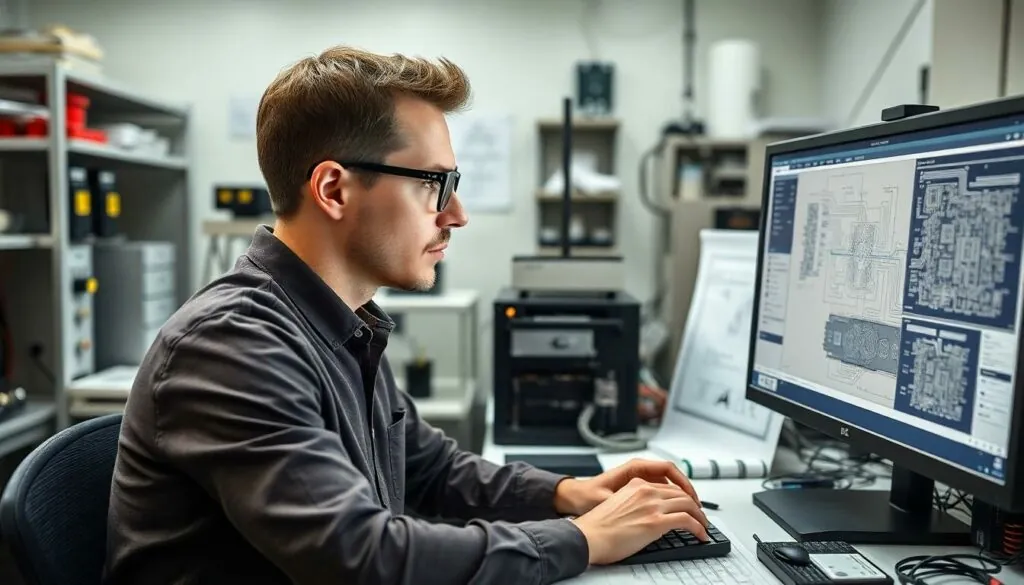Table of Contents
ToggleIn a world where technology reigns supreme, computer hardware engineers are the unsung heroes behind the scenes. They’re the wizards who conjure up the magic that makes our devices tick. If you’ve ever marveled at how your computer runs smoother than a well-oiled machine, you can thank these tech-savvy professionals for their tireless work.
But what exactly does a computer hardware engineer do? Think of them as the architects of the digital realm, designing and testing the physical components that power our favorite gadgets. From motherboards to processors, they ensure everything works in perfect harmony. So, whether you’re dreaming of a career that blends creativity with technical prowess or just curious about what makes your devices hum, understanding the job description of a computer hardware engineer is the first step into this fascinating field.
Overview of Computer Hardware Engineer Job Description
Computer hardware engineers design, develop, and test the physical components of computers and related devices. They focus on essential elements, such as processors, circuit boards, and memory devices. This role demands a strong understanding of both hardware and software interactions, ensuring seamless functionality.
Project management skills play a pivotal role in the success of hardware engineering tasks. Engineers often lead teams to integrate systems, emphasizing collaboration and communication. Precision is crucial; engineers frequently conduct tests to verify the performance and reliability of hardware products.
Creativity contributes to innovative designs in computer hardware. Engineers often evaluate new technologies and incorporate advancements into their work. They review performance metrics and specifications to improve existing products and create new solutions.
Collaboration with other engineers and professionals enhances project outcomes. They work closely with software developers, ensuring compatibility between hardware and software. Understanding industry standards and regulations helps engineers maintain compliance and enhance product safety.
Education requirements typically include a bachelor’s degree in computer engineering or a related field. Practical experience with hardware systems and software tools is beneficial. Many employers seek candidates with knowledge of circuit design, schematic capture, and debugging processes. Certifications may also enhance job prospects and demonstrate expertise.
Ultimately, computer hardware engineers ensure technology operates efficiently and effectively. Their contributions are vital, as they lay the groundwork for the devices that power modern computing and communication.
Key Responsibilities

Computer hardware engineers play a pivotal role in creating the technology we rely on daily. Their responsibilities encompass designing hardware, testing designs, and collaborating with software engineers.
Designing Hardware Components
Designing hardware components involves creating blueprints and specifications for essential devices. Engineers utilize CAD tools to develop detailed layouts for circuit boards and processors. Precision remains crucial during this phase to ensure that components function as intended. Innovative thinking contributes to the development of new technologies that improve device performance. Engineers often refer to industry standards to meet regulatory requirements while designing their systems.
Testing and Analyzing Designs
Testing and analyzing designs is essential for verifying hardware functionality. Engineers conduct rigorous tests to assess performance, reliability, and compatibility with existing systems. They utilize simulation tools to predict potential issues before physical testing. Analyzing data gathered from tests provides insights that inform design adjustments. Feedback loops allow for continuous improvement, ensuring end products meet quality standards.
Collaborating with Software Engineers
Collaborating with software engineers guarantees hardware-software compatibility. Engineers work closely with software teams to optimize performance across platforms. Regular meetings facilitate communication about specifications and potential challenges. The integration of software interfaces with hardware components enhances user experience. Joint efforts lead to innovative solutions that align hardware capabilities with software requirements.
Required Skills and Qualifications
Computer hardware engineers must possess a diverse skill set that combines both technical and soft skills to excel in their positions.
Technical Skills
Understanding digital circuits is crucial for computer hardware engineers. Proficiency in programming languages, such as C and VHDL, enhances their design capabilities. Familiarity with software tools like CAD makes it easier to create accurate blueprints. Engineers need to analyze and troubleshoot hardware issues effectively. Knowledge of microprocessor architecture allows them to assess performance and efficiency. Finally, staying current with industry trends and advancements is essential for innovation and problem-solving.
Soft Skills
Collaboration stands out as a vital soft skill for hardware engineers. Effective communication facilitates teamwork with software engineers and other stakeholders. Additionally, strong analytical skills enable engineers to evaluate designs and find solutions. Creativity plays an important role in developing innovative hardware configurations. Adaptability helps engineers navigate the fast-changing technology landscape. Leadership abilities, especially in project management, are necessary to guide teams toward successful outcomes.
Typical Work Environment
Computer hardware engineers typically work in office settings, labs, or manufacturing facilities. Softly-lit labs feature various testing equipment where engineers analyze prototypes. Collaborating with other team members fosters an environment that enhances creativity and innovation.
Most engineers spend significant time in front of computers, utilizing CAD software to design hardware components. Shared workspaces encourage communication and brainstorming among teams tackling complex projects. Engaging in regular meetings with software engineers promotes the alignment of hardware and software systems.
Flexibility may vary by organization, with some engineers working traditional hours while others adopt variable schedules to meet project deadlines. High-stakes projects often require extended hours, especially as deadlines approach. Remote work opportunities have emerged, accommodating engineers who balance personal and professional responsibilities.
Work environments can also include on-site visits to manufacturing plants for assessments and coordination of hardware production. Exposure to various industries leads to diverse experiences, as engineers may develop hardware for consumer electronics, automotive applications, or industrial machinery.
Collaborative problem-solving remains integral to the role, with engineers frequently participating in interdisciplinary development teams. Overall, environments prioritize teamwork, innovation, and precision in hardware engineering practices.
Career Outlook and Opportunities
Job prospects for computer hardware engineers remain strong. According to the Bureau of Labor Statistics, employment in this field is projected to grow 2% from 2021 to 2031. The demand for skilled engineers stems from advancements in technology, such as artificial intelligence, machine learning, and the Internet of Things. Industries such as telecommunications, automotive, and aerospace seek professionals to develop cutting-edge hardware solutions.
Many emerging fields offer unique opportunities for computer hardware engineers. Specializations like embedded systems and cybersecurity hardware design become increasingly relevant. Engineers who focus on these areas can expect higher demand and competitive salaries. Organizations continually seek experts to implement secure, efficient designs.
Networking plays a crucial role in career advancement. Attending industry conferences, engaging in professional organizations, and participating in online forums can yield valuable connections and job leads. Collaborating with other professionals enhances knowledge-sharing and can lead to potential job offers or partnerships.
Additionally, gaining certifications enhances credibility. Certifications such as Certified Hardware Engineer (CHE) or Certified Electronics Technician (CET) are valuable assets. Employers often prioritize candidates with proven expertise, reflecting their commitment to ongoing education.
Salary ranges for computer hardware engineers vary significantly. The median annual wage is approximately $119,560, with entry-level positions starting closer to $80,000. For those in senior or specialized roles, salaries can exceed $150,000 depending on expertise and location.
Overall, pathways to major careers in computer hardware engineering are robust. Engineers equipped with technical skills, creativity, and collaboration experience can easily navigate the evolving job market. Opportunities abound across various sectors, paving the way for a fulfilling career.
The role of a computer hardware engineer is vital in today’s tech-driven world. These professionals not only design and develop essential components but also ensure that technology operates seamlessly. With a blend of technical expertise and strong interpersonal skills, they navigate complex projects and foster collaboration across teams.
As the demand for innovative technology continues to grow, opportunities in this field are expanding. Those interested in pursuing a career in computer hardware engineering can look forward to a rewarding path with competitive salaries and the chance to work on cutting-edge advancements. The future is bright for those ready to embrace the challenges and creativity that come with this dynamic profession.






